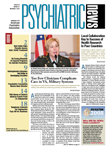A continuing critical shortage of psychiatrists and psychologists in the armed forces and access to quality mental health care for veterans in rural areas are issues that must be addressed now, mental health leaders told members of Congress and their staffs last month.
Military and veterans officials and others identified key concerns in the treatment of mental illness during the 2007 Mental Illness Awareness Week Congressional Symposium, jointly sponsored by APA and the National Alliance on Mental Illness (NAMI). The Capitol Hill briefing described the progress made in identifying and treating mental illness among active-duty and veterans groups, as well as thesignificant work that remains (see also
VA Told to Establish Multiple Prevention Programs).
“We have to be realistic that when we send men and women to war zones, we are placing them at great risk for developing psychiatric disorders,” said Daniel Blazer, M.D., Ph.D., a psychiatrist and member of the Department of Defense Mental Health Task Force, which recently concluded its work with the release of a report on the need to improve mental health services for members of the military and their families (Psychiatric News, August 3). “If we don't pay attention to their mental health, then we are closing our eyes to the real-life cost of sending them to war.”
The risk of developing mental illness as a result of combat exposure is as real as the risk of incurring physical injuries, and the government needs to be ready for that eventuality, he said. At this point the military is falling short of that commitment to provide sufficient care.
Blazer and others cited a shortage of psychiatrists and psychologists in the armed forces as the leading obstacle to effective mental illness detection and treatment for those who serve in the Iraq and Afghanistan war zones.
His conclusion echoed the leading finding in the task force's report:“ The Military Health System lacks the fiscal resources and the fully-trained personnel to fulfill its mission to support psychological health in peacetime or fulfill the enhanced requirements imposed during times of conflict.” The task force urged more funding to retain existing personnel and to add more, so members of the military would have greater access to care.
This proposal will require not a one-time infusion of additional funding, Blazer said, but “sustained increased funding to shore up mental health care for our soldiers.”
One way the military has attempted to increase access with limited personnel is to increase the use of telemedicine, including in Europe. However, technological limitations have restricted its use in Afghanistan and Iraq, according to Col. Elspeth Ritchie, M.C., psychiatric consultant to the Army surgeon general.
Access obstacles also limit the mental health services that the Department of Veterans Affairs (VA) is able to provide, according to several speakers. However, veterans' access problems were attributed more to geography than to staff shortages.
Ira Katz, M.D., deputy chief of patient care services officer for mental health in the VA, said, however, that the 200,000 VA employees—including 2,000 psychiatrists—have been able to meet most of the mental health care needs of U.S. veterans, fewer than 12 percent of whom require treatment for PTSD or other mental health problems. The hiring of 3,600 more“ mental health professionals” in the last three years has allowed the VA system to offer increased treatment sought by recent veterans of the wars in Iraq and Afghanistan, who are much more likely than older veterans to seek mental health care. Thirty-six percent of the 250,000 Iraq and Afghanistan veterans who have sought care in the VA system were treated for mental health problems.
Katz stressed, however, that “no matter how much the VA expands access, there will continue to be challenges in providing care, especially in rural areas.”
VA Needs to Forge Partnerships
One way to address rural access is for the VA to partner with state and local health care systems in rural areas that lack VA mental health professionals, said Frederick Frese, Ph.D., a member of the NAMI board of directors and a consumer advocate.
Legislation (S 38 and HR 2689) to authorize the VA to contract with community health centers and “other qualified entities” to provide mental health services in areas not adequately served by VA facilities has been introduced in Congress, but has not yet advanced.
Another barrier to mental health care for members of the military is their fear that treatment for psychiatric problems will hurt future chances to advance in rank or get jobs once they leave the military. “Stigma has not gone away,” Ritchie emphasized.
The branches of the military have tried to lessen stigma by making psychiatrists and mental health professionals readily accessible to frontline troops, including the assignment of more than 200 Army clinicians to Iraq and Afghanistan, at any given time.
Another way to address stigma, according to Gail Wilensky, Ph.D., a member of the President's Commission on Care for America's Returning Wounded Warriors, is to challenge the belief that treatment blocks career advancement. She encouraged the armed services to have young officers who have received treatment and subsequent promotions share their experiences with other members of the military.
Leaders in each service branch have begun programs to educate their members about mental illness and encourage them to urge their buddies who display the warning signs of mental health problems to seek treatment. Several military installations, such as Fort Bragg in North Carolina, have begun to embed“ mental health workers” in their general medical units, which allows soldiers to seek care in a less-obtrusive way.
Challenges Remain
Another challenge facing military and veterans health care providers is the elevated suicide risk their patient populations face. The VA response to increased suicides by veterans has included the assignment of a full-time suicide prevention coordinator to each VA medical center and launching a national suicide prevention hotline (Psychiatric News, September 7).
Other challenges with which the military and VA mental health systems are wrestling include better understanding of posttraumatic stress disorder and traumatic brain injury and the best treatments for those conditions.
In addition to the many usual war-related mental health problems, mental health professionals are struggling to understand the best way to treat the effects of repeated concussive injuries and how those interact with PTSD, Wilensky said.
The text of the Veterans Mental Health Outreach and Access Act can be accessed at<http://thomas.loc.gov> by searching on bill number, S 38. The report of the DoD Task Force on Mental Health is posted at<www.ha.osd.mil/dhb/mhtf/MHTF-Report-Final.pdf>.▪

